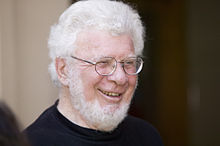Leonard Herzenberg
| Leonard Herzenberg | |
|---|---|
 |
|
| Born | Leonard Arthur Herzenberg November 5, 1931 New York City, New York |
| Died | October 27, 2013 (aged 81) Stanford, California |
| Nationality | American |
| Fields | Immunology, genetics |
| Institutions |
Stanford University Pasteur Institute |
| Alma mater |
Brooklyn College California Institute of Technology |
| Thesis | Studies on a Cytochrome Destroying System in Neurospora (1956) |
| Doctoral advisor | Herschel K. Mitchell |
| Known for | FACS |
| Notable awards | Kyoto Prize (2006) |
| Spouse | Leonore Herzenberg |
| Children | Jana Herzen |
|
Website www |
|
Leonard Arthur "Len" Herzenberg (November 5, 1931 – October 27, 2013) was an immunologist, geneticist and professor at Stanford University. His contributions to the development of cell biology made it possible to sort viable cells by their specific properties.
Herzenberg was born in New York City, U.S.A.. He received his bachelor's degree in 1952 from Brooklyn College in biology and chemistry. In 1955, he received his Ph.D. from California Institute of Technology in biochemistry with a specialization in immunology for studies on in Neurospora.
After school he was a postdoctoral fellow at the American Cancer Society, working in France at the Pasteur Institute. He returned to the United States in 1957 and worked for the National Institutes of Health as an officer in the Public Health Service department. He started working at Stanford in 1959. He eventually earned the title Professor of Genetics.
In 1970 Herzenberg developed the fluorescence-activated cell sorter (FACS) which revolutionized immunology and cancer biology, and is the basis for purification of adult stem cells.
Herzenberg and his wife, Leonore Herzenberg, ran the Herzenberg Laboratory at Stanford together until his death. Their daughter, Jana Herzen, is a singer-songwriter and the founder of Motéma Music. He died on October 27, 2013 aged 81.
Herzenberg received a range of honours and awards during his life including:
...
Wikipedia
